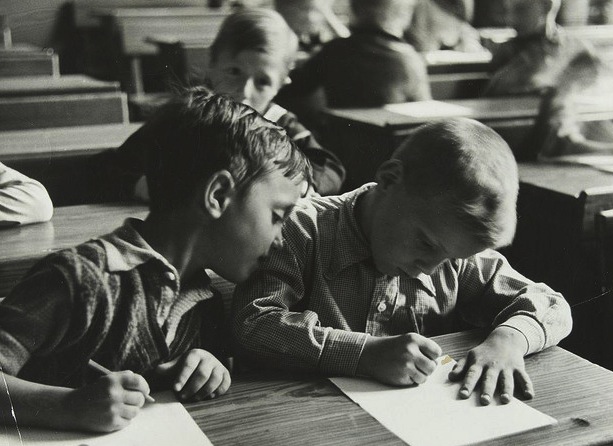
How should a high school respond when drugs are found in a student’s locker or a fight breaks out on campus? Most choose suspension or expulsion. But the zero tolerance policies adopted by American schools for the last 20 years have not proven effective at reducing school violence or improving student performance. Research also points to troubling racial and gender disparities in how schools mete out justice.
Educators are experimenting with alternative methods of discipline to combat truancy, tardiness, defiance, and bullying—from creating teen courts to addressing students’ underlying trauma or health problems.
In advance of the Zócalo/California Endowment event “How Should Schools Discipline Children?”, we asked people who are concerned about improving K-12 schools in California the following question: What is the most pressing discipline issue in our schools?

For too long, schools have failed to recognize that suspension and expulsion can have a huge, negative impact on a student’s education. Harsh discipline doesn’t address the roots of why a student is acting out in class, and students who are suspended are more likely to fall behind and become even harder to reach. Research has shown that a ninth grader who is suspended even one time is twice as likely to fail to graduate.
A school’s approach to discipline also reveals a lot about its educational environment. High-suspending schools experience chaos in the classroom, low achievement, and poor morale. The research is clear that suspension results in bad outcomes and does not improve students’ behavior, attendance, or achievement. Moreover, this is a civil rights issue that requires our immediate attention. Students of color, particularly African-American students, are being suspended at disproportionate rates. There is a legal and moral imperative to find other solutions.
As someone who’s worked for years with students in crisis, I’ve seen what can happen when schools embrace alternatives to harsh school discipline. Schools that set high standards for student behavior, and then reinforce those standards with positive support enjoy better climates, improved achievement, and higher teacher morale. When students and teachers feel supported and welcomed, great things can happen.
By dumping harsh school discipline, schools can embrace what matters most to teachers, students, and communities: engagement, growth, and learning to be responsible to yourself and others. Ending suspensions for “willful defiance”—the reason most often given for minor misbehavior—is especially urgent. Los Angeles Unified School District (LAUSD) has already taken that step, and San Francisco Unified School District is now considering the same move.
But school districts need more guidance at the state level. State lawmakers are now considering a bill, AB 420, to stop suspensions for willful defiance for the youngest students and encourage alternatives to suspension for older students. Legislation like this sends the right message to school districts in California: Learning and discipline are connected at the root.
The state’s new school funding formula recognizes that schools need to address school climate, including high suspension and expulsion rates. The time to do so is now. You can learn more about low-cost or free research-based alternatives to harsh discipline at FixSchoolDiscipline.org.
Laura Faer is statewide education rights director at Public Counsel. In 2012, Public Counsel sponsored and supported five new California laws that address the harms caused by harsh school discipline and is co-sponsor of AB 420, currently in the legislature.

The United States has a higher concentration of prisoners than any other country on the planet. California leads the country in prison spending. And Los Angeles is home to the largest dedicated school police department in the country, the Los Angeles School Police Department (LASPD), which has a $52 million annual budget. These facts need to be understood in terms of how they impact educational policy and outcomes.
The most pressing discipline issue in Los Angeles is the criminalization of student behavior—especially students of color—and how that creates a school-to-jail track in our schools.
The LASPD ticketed more than 33,000 students in Los Angeles County from 2009 to 2011. Virtually all of these tickets and arrests were for incidents that schools traditionally handled without criminalizing youth—skipping class, smoking, drinking, writing on desks or walls, and school fights. Since the institutional expansion of school policing, students who misbehave are funneled to the Los Angeles County Juvenile Court.
The good news is that our work has been reversing this trend. The Community Rights Campaign and our allies have worked to curb some of the most punitive aspects of the school-to-jail track, from the criminalization of truancy to mass ticketing and arrests in schools. We have moved the needle with our allies and LAUSD leadership in ending harsh discipline practices in L.A. County. Last year alone, there was a 90 percent reduction in truancy tickets and a 50 percent reduction of all other school-based tickets.
There is still work to do to address this issue. A recently released report by the Community Rights Campaign, Black, Brown and Over-Policed in L.A. Schools, revealed that there were nearly 5,000 LAUSD students arrested or issued tickets in the 2012-2013 school year. The majority of the students who received these citations—93 percent—were black and Latino. Forty-seven percent of the tickets were issued to students age 14 and under.
Community Rights Campaign is now urging the LAUSD to adopt the Equal Protection Plan, which includes a new police protocol to limit ticketing and arrests and to implement restorative justice alternatives to end the school-to-jail track.
Manuel Criollo is director of organizing of the Labor/Community Strategy Center and Community Rights Campaign, which organizes students to reverse the school-to-jail track at LAUSD and has led important reforms to decriminalize the truancy ticketing policies of the City and County of L.A.

The term “discipline” means different things to different people. In one interpretation, it’s how we punish students for making poor choices. Sell drugs on a school campus? A student faces automatic expulsion, as mandated by state law, and enrollment in a county school for juvenile offenders. Get into a fight on campus? The students who were involved face arrest by local police. They might be charged with aggravated assault and are often expelled.
But there’s another meaning of the word “discipline”: how we shape students’ behavior so they learn to exercise self-control and demonstrate genuine academic effort. After all, the vast majority of students are not drug dealers—they simply don’t have the necessary tools to succeed in school. Too many schools just give a student an “F” when they don’t turn in their assignments. But failing grades alone rarely translate into more completed work.
My research and experience as a teacher tell me that middle school is the critical period for students to develop good habits and become committed to their schoolwork. Middle school is the turning point when independent study becomes paramount to school success. Students at this age can grow rapidly in their cognitive capacities to plan, think long-term, and reflect on their own learning—but only if they receive careful mentoring.
Fortunately, some middle schools have created special programs to support students. For example, at San Lorenzo Valley Middle School in Felton, California, each and every student receives extensive academic counseling and intervention early in the school year. The idea, according to the school’s staff, is to make sure that “no child is allowed to dig a hole so deep they cannot succeed.” A vast network of teachers, other students, staff, advisory classes, and, yes, parents work together to ensure that every student turns in every assignment. By demanding that all tasks be completed, the school inculcates a habit of mind that promotes responsibility.
Schools that hold students accountable—and provide them with the support they need—help them to develop the self-discipline to succeed in school and life.
Kip Téllez is a former K-12 teacher, and a professor and former chair in the education department at UC Santa Cruz. He is the author of Teaching English Learners: Fostering Language and the Democratic Experience (Paradigm Publishers).

For the last five months, the Central California Children’s Institute has been working with nine Central Valley school districts to reform their discipline policies. The goal is to help these districts reduce suspensions and expulsions and address the ethnic and racial disparities that are pervasive in disciplinary strategies across the state.
We have observed that in many districts, there is a culture of mistrust, ineffective communication, defensiveness, and displacement of blame. The climate and culture of schools and districts affect the behavior and achievement of students at every grade level.
Clearly, it is not a simple, easy undertaking to create a paradigm shift in the attitudes, beliefs, communication strategies, and relationships of teachers, students, administrators, families, and communities. Such a transformation will undoubtedly take substantial time and effort from all parties and cannot be done quickly if the goal is to make lasting change. One simple way to begin to address negative school climate and implicit bias is to identify and confront the attitudes and beliefs—of all individuals involved—that prohibit students from achieving their potential. The willingness of administrators to look deeply into their implicit attitudes and beliefs (including those outside of their awareness) is the first crucial step to transform school culture—and therefore student discipline and success.
Heather Berg is the project coordinator of the Central California Children’s Institute’s Positive School Discipline for Improved Social and Emotional Health, which is funded by the California Endowment. Her educational and employment background is in social psychology, education, and program evaluation.



